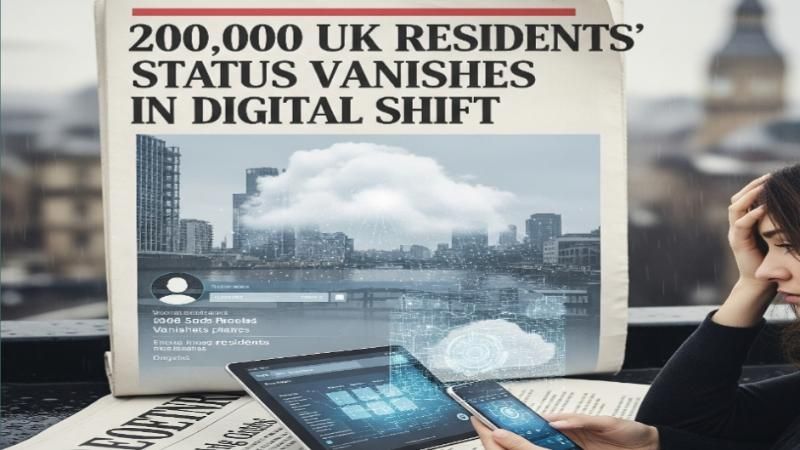A digital transformation within the UK's immigration system is casting a long shadow over the lives of up to 200,000 individuals who have legally called Britain home for decades. This ambitious Home Office initiative to convert all paper immigration records to digital formats, aimed at bolstering control over the system, is inadvertently creating a precarious situation for a significant segment of long-term residents.
Many of those most vulnerable are older individuals, some with limited digital literacy, who arrived in the UK from countries across Africa and Asia in the 1970s and 1980s. A substantial portion of this group includes those from Bangladeshi, Indian, and Pakistani communities who have held indefinite leave to remain for extended periods but, for various reasons, never obtained British citizenship. Their legal status was originally confirmed through physical documents like ink stamps or vignettes in their passports, or simple paper confirmations – collectively known as legacy documents. Worryingly, the Home Office currently lacks comprehensive digital records for many in this demographic.
While the Home Office has actively encouraged eligible individuals to create an online eVisa account to replace their physical legacy documents, the transition is proving far from seamless. Despite official assurances of the system's effectiveness for millions, widespread reports of technical difficulties persist. Users frequently encounter problems linking their existing passports to their new eVisa accounts, with reports of incorrect personal details or complete inability to view their status after attempting to create an account.
The organization the3million, a prominent advocate for the rights of EU citizens in the UK, has been closely monitoring the eVisa rollout and expresses grave concerns. They highlight the Home Office's apparent inability to effectively track and communicate with this large group of long-term residents as a critical flaw. This communication gap, combined with persistent system glitches, raises fears that many could inadvertently lose their legal status simply by being overlooked by the new digital framework.
An internal Home Office assessment from April 2022 estimated the number of affected individuals to be around 200,000. These individuals may not have been fully captured in previous immigration databases. Despite repeated inquiries, clarity on how many of these individuals remain in the UK and if their records are now fully digitized remains elusive.
Naga Kandiah of MTC Solicitors, who assists older clients grappling with legacy documents, underscores the perilous situation. "Individuals who were previously granted indefinite leave to remain or other long-term statuses via ink-stamped endorsements are increasingly being left behind," he stated. Kandiah warns that, despite their lawful status, many are now at serious risk of being treated as undocumented because their physical documents are not recognized or integrated into the Home Office’s new digital eVisa platform. This vulnerable group, often comprising elderly, marginalized, or digitally excluded individuals who have resided in the UK for over 30 to 40 years, are becoming "effectively invisible within the current system." This has led to reports of individuals being denied access to essential services and entitlements, including pensions, universal credit, NHS treatment, and housing, due to their inability to digitally prove their status.
The transition timeline for eVisas has also seen adjustments. While a full digital-by-default system was initially eyed for early 2025, the Home Office has acknowledged significant problems. The "grace period" for using expired Biometric Residence Permits (BRPs) for international travel was extended multiple times, with June 1, 2025, now confirmed as the effective new eVisa deadline. As of June 2, 2025, expired BRPs and EU Settlement Scheme Biometric Residence Cards (BRCs) are no longer accepted as proof of immigration status for travel, meaning individuals must now rely solely on their eVisa or alternative valid documentation.
Even for those attempting to engage with the eVisa system, numerous obstacles persist. The widely reported case of Kathleen Harper, an American actor with an indefinite leave to remain stamp, exemplifies these difficulties. Despite multiple attempts and Home Office technical adviser assistance, she repeatedly encountered system errors. While her specific issue has since been resolved, her experience underscores broader systemic flaws. More recently, in March 2025, reports from the3million highlighted widespread identity document errors on UKVI digital status platforms, with some individuals finding incorrect nationalities or document numbers associated with their accounts. This raises significant concerns about data accuracy and potential privacy breaches.
Monique Hawkins of the3million continues to advocate for an independent review of the entire eVisa system and its hurried rollout. The organization has engaged in multiple discussions with the Home Office to raise concerns and propose solutions, including a detailed troubleshooting guide and offline alternatives. However, the government has largely maintained its "digital by default" approach, resisting proposals for physical backup documents or accessible app-based solutions. Without substantial improvements and robust contingency measures, concerns remain that this digital migration could inadvertently marginalize a significant number of long-term legal residents, particularly those from communities with deep roots in the UK who may now find their established lives in unforese
en jeopardy.








.svg)



